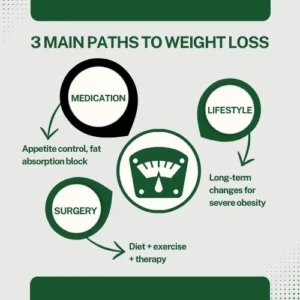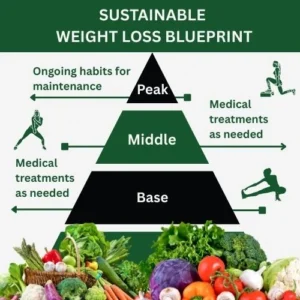There is no paucity of information in regard to the topic of weight loss treatment FAQs but the bad news is that, at times, this nondescribed statement may induce confusion. There are more options than one can handle, medication, surgery, lifestyle programmes; and, they all seem to be promising. You might be wary of new approaches to looking into weight loss as an adventure, or be curious of what you should know to support your weight loss efforts, and that is normal.
Here in this blog post we answer the most commonly searched questions related to weight loss treatments- so you can make the right choice and decisions with confidence.

1. Which are the most used medical ways to lose weight?
Medical weight loss usually falls into three categories: prescription drugs, lifestyle programmes (diet and exercise), and bariatric surgery. FDA-approved injections of weight loss, such as Mounjaro, Wegovy, and Ozempic, have become more popular in recent years because of their substantial outcomes in clinical trials.
The medicines commonly prescribed tend to either prevent or reduce appetite, make a person feel full, or inhibit fat absorption. Nevertheless, they are normally used together with changes in lifestyle and are not a sole resolution.
2. Are weight loss injections effective?
Indeed, the shots in the bid to lose weight have been seen to work well especially to those who have been faced with the problems of obesity or those who have health complications due to the fact that they are overweight. Semaglutide (Wegovy) and tirzepatide (Mounjaro) are medications whose properties mimic genuine hormones in the body that regulate hunger and insulin production. They will reduce hunger, lower metabolism in the digestive condition and increase the regulation of blood sugar.
It is demonstrated in clinical trials that the patients who receive these injections and maintain healthy eating and exercise habits have been capable of losing an amount of 15-20 percent of their bodyweight, within the period. The findings are never uniform though and one has to use it regularly to maintain the gains.
3. Do weight loss remedies have side effects?
Yes, like in any medical therapy certain side effects may arise. Side effects of weight loss medications and weight loss shots are:
- Nausea
- Constipation or diarrhoea
- Headaches
- Dizziness
- Fatigue
Side effects are possible risks during surgery, as well as infection, or chronic nutritional depletion which can occur with surgical procedures. Talking to a qualified healthcare provider to balance pros and cons regarding your health profile is necessary to speak about these risks.
4. Is it a last resort undergoing weight loss surgery?
Other weight loss measures having been exhausted, particularly among individuals with a BMI greater than 40 or BMI greater than 35 with obesity-related problems (such as type 2 diabetes or sleep apnoea), gastric bypass or sleeve gastrectomy forms of bariatric surgery may be considered.
Although surgery may result in dramatic and long term weight loss, surgery also entails dietary changes carried throughout a lifetime as well as follow up care requirements. It is nothing within an easy fix, but at the same time it can change the life of the person that qualifies and is prepared to take the journey through all of it.
5. Is it possible to lose weight without medication and surgery?
Absolutely. Healthy and permanent weight loss can be and is achieved by lifestyle changes and not drugs. One of the keys to any successful plan consists of:
- A diet that is sensible, and calorie-aware.
- Physical exercise traditionally.
- Emotional eating behavioural support or therapy.
- A nice sleep and stress control.
6. But how can I be sure what treatment is appropriate?
There is no easy universal answer. It depends on what is the best approach to you:
- Medical history.
- BMI weight loss objectives.
- Lifestyle habits.
- Motivation level.
- Realised pathologies.
A physician with an obesity medical focus can evaluate your unique needs and suggest a successful and safe plan. This may occasionally require beginning with dietetic programme and counselling and in other instances taking medications or conducting surgery.
7. Do I lose weight when I quit the treatment?
This is a justified apprehension. When people cease to take their medication or even when they have surgery some of them put some weight back once they get back to their old ways. Success should be sustained by establishing long-term habits and realisation that the treatment is only a small segment of a bigger picture.
Maintaining weight is a long term thing rather than a temporary solution. This is why integrating any therapy with behavioural change and lifestyle modification gives the greatest likelihood of maintaining weight loss.

Final Thoughts
Given the number of weight loss alternatives in the world today, one would be excused to have some questions. It depends on getting the right information, speaking with the professionals and what is realistic and attainable to you. Regardless of whether you may be thinking of injections, or pills, or an operation, or changing your lifestyle, the information can serve you best.

Leave a Reply